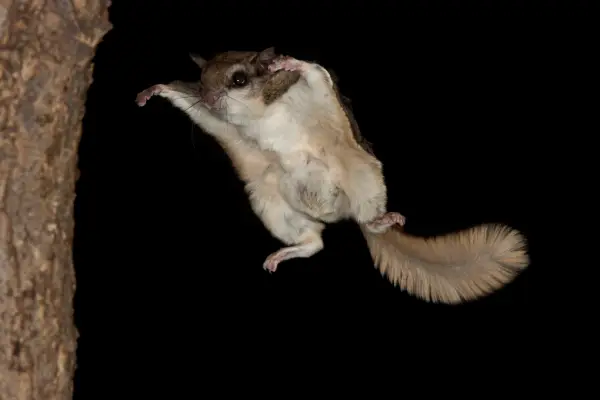
They’re smaller and less visible than their non-flying cousins — but don’t let flying squirrels fool you. These nocturnal creatures, common in the southeastern United States, like to nest in low-traffic areas and leave behind unsanitary droppings. Over time, a family of flying squirrels can become a serious nuisance, gnawing on wooden supports, and even compromising your home’s electrical wiring. Our flying squirrel removal service stops them in their tracks.
If you’re hearing strange nighttime chirps or finding telltale signs of flying squirrels, Lookout is here to help. We offer professional flying squirrel control in Georgia, Tennessee, Alabama, and Kentucky. Don’t wait — call us today for a free estimate!
Why Call Lookout for Flying Squirrel Removal Services?
We’re licensed and insured for handling flying squirrels in Kentucky, Tennessee, Alabama, and Georgia. But why choose us? Plain and simple, we’ll go above and beyond to make sure your problem is solved.
- Comprehensive Inspections: Before we get started, we conduct a thorough examination of your property. From attic beams to roof vents, we identify every point of entry and nesting spot to develop a targeted plan.
- Tailored Solutions for Lasting Relief: Flying squirrels are highly adaptable and quick to relocate. We design a customized strategy — with trapping, exclusion, and preventative measures — that ensures a long-term solution rather than a temporary fix.
- Effective Exclusion and Prevention: Removal is only the first step. We’ll also help you secure your home against future issues, identifying vulnerable access points and offering practical tips to prevent their return.
- Prompt and Reliable Service: When nocturnal critters keep you up at night, time is of the essence. Our team responds quickly to restore your peace of mind and protect your investment.
Need a Squirrel Control Estimate?
Click below to leave your information and we will call you right back!
Get your free estimate today!
Leave your information below and we will give you a call back.
After-hours inquiries will be returned the next business day.
How Do You Know If You Have Flying Squirrels in Your House?
You shouldn’t ignore flying squirrels in your home. Left unchecked, they will cause problems. And the longer you leave them, the more problems they’ll cause.
- Late-Night Activity: Scratching, scurrying, and soft chirps in the attic during the wee hours can indicate flying squirrels are at play.
- Droppings and Nesting Debris: Look for small, elongated droppings and shredded materials—like insulation, bark, and leaves—piled in hidden corners.
- Chewed Entry Points: Small gaps or holes near rooflines, soffits, or fascia may be widened or gnawed on, as these squirrels sneak inside.
- Stashed Food: Nuts, seeds, and acorns stored in attics or crawl spaces are a strong hint that you’re hosting these aerial acrobats.
What Are the Dangers of Flying Squirrels?
Though not typically aggressive, flying squirrels bring a range of risks when they move indoors:
- Structural Damage: Constant gnawing can weaken wooden beams, support structures, and even rooflines.
- Electrical Hazards: Chewed wires increase the risk of short circuits and electrical fires.
- Health Concerns: Droppings and nesting materials can carry parasites, fungi, and bacteria, potentially affecting indoor air quality.
- Widespread Infestations: Flying squirrels often live in colonies, meaning you could be dealing with more than just one or two unwelcome guests.
How Do You Tell Flying Squirrels Apart from Regular Squirrels?
When you spot one in a tree, it can be hard to tell a flying squirrel apart from a regular squirrel. Their most notable feature – the flaps of skin that allow them to glide – may not be obvious. While both are members of the same family and our squirrel control experts have experience with both, there are some key differences:
- Size and Appearance: Flying squirrels are generally smaller, with large, dark eyes and a distinctive membrane of skin between their front and rear legs that allow them to glide.
- Nocturnal Habits: Unlike most tree squirrels that are active by day, flying squirrels venture out after sunset, making their presence known through nighttime noises.
- Subtle Entry Points: Flying squirrels often slip through tiny gaps thanks to their petite size and flexible bodies, while regular squirrels typically require larger openings.
Need Flying Squirrel Control Services? Call Us Now!
Don’t let flying squirrels transform your attic into their private runway. Our trained wildlife control professionals provide effective and long-lasting solutions. From thorough inspections and removal to expert exclusion tactics, we’re committed to restoring your peace of mind.
Call us today to schedule an inspection or request a free estimate!
Back to Squirrel ControlFlying Squirrel Control in Tennessee, Georgia, Alabama, and Kentucky
Serving the Southeastern United States
Tennessee | Chattanooga Metro | Nashville Metro | Knoxville Metro
| Georgia | Atlanta Metro
Alabama | Huntsville Metro | Birmingham Metro |
Kentucky | Bowling Green Metro | Hopkinsville | Russellville
Home » Wildlife Control » Squirrel Control » Flying Squirrel Control
